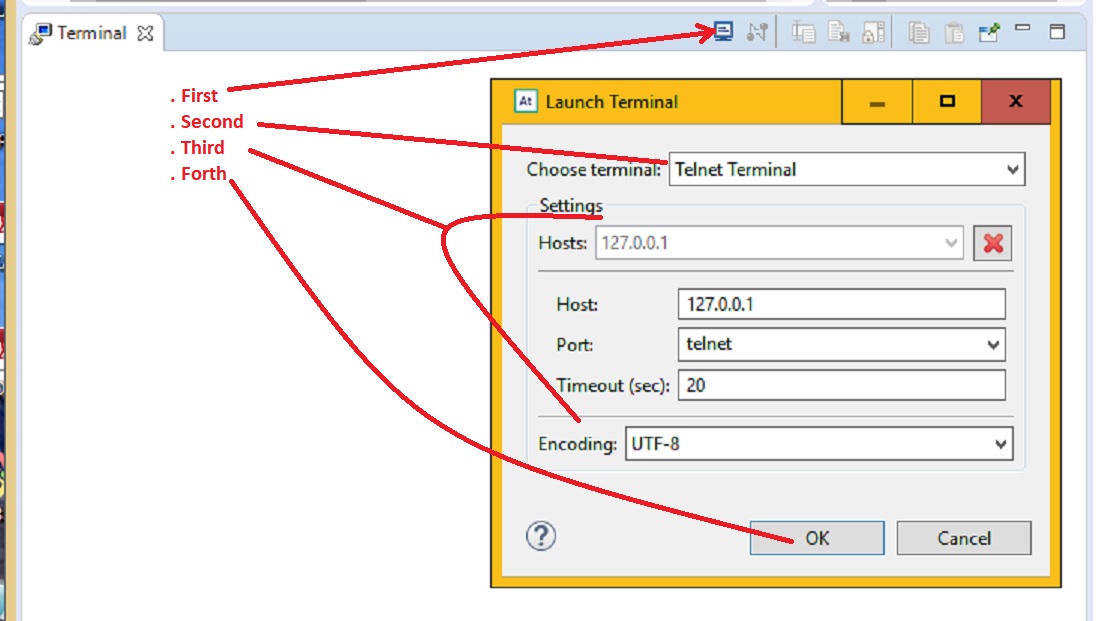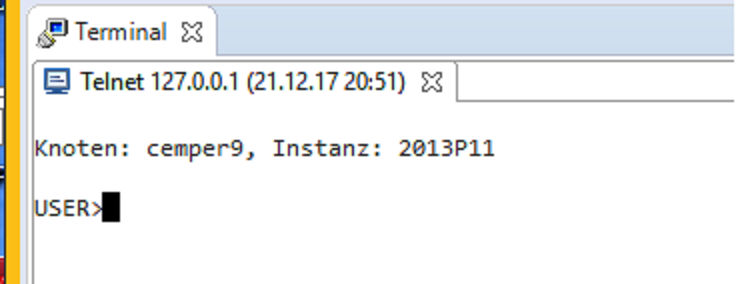valid observation.
- Log in to post comments
valid observation.
is Enable %Service_Telnet set ?
in the Management Portal (http:///csp/sys/sec/%25CSP.UI.Portal.Services.zen)
My Caché runs on Win .(I'm not sure if this works also for Caché on Unix )
It does NOT work for Unix:
| %Service_Telnet | Yes | Yes | Unauthenticated | Unrestricted | Controls Telnet sessions on a Windows server |
So on UNIX you go to bash and have to start via csession....
so what you are looking for is something similar to XML IGNORENULL = 1
short time ago I ended up with export to XML and then convert XML to JSON.
Not so impressive but better than chasing unwanted "".
Right: if you don't establish TELNET connection it's just bash or MS-DOS depending on your local OS.
Also for local localhost access !
so from Help:
 Terminal View.
Terminal View.Setup Connection

And you get your Caché Terminal

HTH
Funny to meet amCharts again as I presented it first to customers as alternative to ZEN graphics
around 2011/12 with Caché 2011.1![]()
¿ did the answers solve the issue ?
and keep quiet when it installs.
this is not Caché and it takes it's time ![]()
(I just spent 25 min for an Update/Upgrade)
It is. I have used it some time ago.
You need a suitable plug in and connect to port 23 of your server
(provided it is not blocked by Win* firewall.
plugin from the following update repository: http://download.eclipse.org/tm/terminal/marketplace/.
 Help > Install New Software from the main menu.
Help > Install New Software from the main menu.Because it's so easy I've added a solution for those readers that don't refuse to work with Caché Objects & Classes .
Class Definition
Simple display method
Extended test data
Result
what's wrong with Caché Objects and Classes ?
I remember, you had a similar fear some time ago ![]()
Class not found + Win7 makes me think you should check your System Variable CLASSPATH ?
just a guess.
This is one of my personal reasons to use PuTTY or WebTerminal or anything else than TERMINAL.
Kevin,
if you call a ClassMethod() it will return whatever the type of return value is like.
some variants:
- your Classmethod generates the CSV file as you do and the return value is the filename
ClassMethod Kevin1() as %String [SqlProc]
{
....... generate CVS File
quit Filename
} - instead of a file you generate a 2 dimensional $Piece String (, as field separator and ^ as record separator)
ClassMethod Kevin2() as %String(MAXLEN="") [SqlProc]
{
....... setup ResultSet
set output=""
while rs.Next() {
for col=1:1:rcws.GetColumnCount() { set output=output_rs.GetData(col)_"," }
set output=output_"^"
}
quit output
} - a similar thing could be rows as a list of JSON sets
ClassMethod Kevin3() as %String(MAXLEN="") [SqlProc]
{
set output=""
&SQL( SELECT LIST(line) into :output FROM (
Select top 3 JSON_OBJECT('Name':Name
,'ZIP':Home_ZIP
,'State':Home_State) as line
from sample.Person where name [ 'A' )
)
)
quit output
}
/// {"Name":"Xiang,Agnes O.","ZIP":56604,"State":"MT"},{"Name":"Zubik,Bill A.","ZIP":78872,"State":"NV"},"Name":"Schaefer,Alvin X.","ZIP":63607,"State":"ME"}
in all cases you have to disassemble the result on the EXCEL end.
BUT as this is MS-EXCEL
my personal preference would be anyhow to connect to Cache over ODBC with a local DSN
and just call your data via SQL and get back a full working XLS table that feeds the rest in your XLS.
This is standard in EXCEL and except for the DSN the same for ACCESS or real DBs.
(as I don't own and use EXCEL any more I can't offer an example)
- your initial question didn't mention CSV nor MS-EXCEL
so my Article on Light weight EXCEL Download may apply
https://community.intersystems.com/post/light-weight-excel-download
or Tips & Tricks - SQL to Excel
https://community.intersystems.com/post/tips-tricks-sql-excel
HTH,
Robert
An alternate approach to SOAP:
a) you run your query over JDBC on your DataServer
so you can query what ever you like
b) slightly more sophisticated
you create a ClassMethod with [SqlProc] parameter and also call it over JDBC
like this. SELECT Pkg.Class_ClassMethod()
It's totally up to you what the content of your return value is.
I personally prefer JDBC as it's platform independent
in fact b) is pretty much the same as SOAP just with a different transport that avoids %CSP and its side effects.......
Proposal:
Store your JSON String as %String(MAXLEN="") like a log file
for the typical components type, age, firstname, lastname, ...
create calculated properties that find its content by $piece, $find or some JSON specific stuff.
setup an index on those calculated properties to find your record.
With this approach you keep the origin as you get it and get te indices you may require.
It's pretty similar to what I did to mimic an XML DB with Caché
so 1) =NO 2) =see above 3) =YES 4) = it's just another challenge
Evgeny,
it's great !
![]()
only the link requires adjustment.
NOT https://community.intersystems.com/post/github.com/intersystems-communi…
but https://github.com/intersystems-community/
Hi Tim,
I'm highly interested to see this result.
I tried to do something similar recently to to be able to feed back to the sender what was wrong if something was wrong.
I failed to get the combinations of params for XERCES parser right. XMLIGNORE* worked OK but was not so useful.
You might have a shorter link to contact Marvin Tenner then me. ![]()
![]()
As we see your ID is combined by 3 properties
for the sake of this example I name them id01, id02, id03
so your ID is this combination ID = id01_"||"_id02,_"||"_id03
so you may reformulate your query to make it readable
I'd suggest you apply as Support Engineer @ InterSystems
and over the years you might learn all the secrets of Caché.
I doubt what you ask for is subject for a public forum.
check side conditions of the related column.
from docs:
See details here:
http://docs.intersystems.com/latest/csp/docbook/DocBook.UI.Page.cls?KEY…
especially:
Sample Global Names and Their Uses
If your connection is not stable enough I'd suggest to take a closer look to good old Shadowing.
It's really jungle proof.
I used it in past to transfer data from an oil drill platform somewhere out on the ocean over a satellite link with just 64k bd bandwidth without any data loss. And this link was far from whatever you would expect from a wired connection on ground.
Shadowing did id with incredible stability and no loss.
Cascading of shadowing is also almost unlimited with no issue.
That really sounds like Shadowing or Asynchronous Mirror.
All you have to do is map your Globals,.. to a DB to be "exported"
http://docs.intersystems.com/latest/csp/docbook/DocBook.UI.Page.cls?KEY…
http://docs.intersystems.com/latest/csp/docbook/DocBook.UI.Page.cls?KEY…
teak a look to it.
It's a rare case in combination with %Persistent,
but it makes sense also to exclude any class with Property Abstract=1 in your Query
Firefox Quantum 57.0 (64-bit) worked immediately
Chrome Version 62.0.3202.94 (Offizieller Build) (64-Bit) had troubles.
Thanks Stephen,
Its the same link but works from course page + in different browser
??? and how do you include this in ENSEMBLE ???
Example WebService:
Example Schema1
<?xml version="1.0" encoding="UTF-8"?>
<s:schema xmlns:s="http://www.w3.org/2001/XMLSchema" elementFormDefault="qualified" attributeFormDefault="unqualified">
<s:complexType name="Schema1">
<s:sequence>
<s:element name="Max_Results">
<s:simpleType>
<s:restriction base="s:long">
<s:minInclusive value="1"/>
</s:restriction>
</s:simpleType>
</s:element>
<s:element name="Home-State">
<s:simpleType>
<s:restriction base="s:string">
<s:maxLength value="2"/>
<s:minLength value="2"/>
</s:restriction>
</s:simpleType>
</s:element>
<s:element minOccurs="0" name="Office-State" type="s:string"/>
<s:element minOccurs="0" name="Name-Startswith" type="s:string"/>
</s:sequence>
</s:complexType>
</s:schema>
Example Schema2
<?xml version="1.0" encoding="UTF-8"?>
<s:schema xmlns:s="http://www.w3.org/2001/XMLSchema" elementFormDefault="qualified" attributeFormDefault="unqualified">
<s:complexType name="Schema2">
<s:sequence>
<s:element minOccurs="0" name="Results" type="ArrayOfSchema2Result"/>
</s:sequence>
</s:complexType>
<s:complexType name="ArrayOfSchema2Result">
<s:sequence>
<s:element maxOccurs="unbounded" minOccurs="0" name="Schema2Result" nillable="true" type="Schema2Result"/>
</s:sequence>
</s:complexType>
<s:complexType name="Schema2Result">
<s:sequence>
<s:element minOccurs="0" name="Home-Address" type="Address"/>
<s:element minOccurs="0" name="Office-Address" type="Address"/>
<s:element minOccurs="0" name="Person-Name" type="s:string"/>
<s:element minOccurs="0" name="Person-ID" type="s:long"/>
</s:sequence>
</s:complexType>
<s:complexType name="Address">
<s:sequence>
<s:element minOccurs="0" name="Street">
<s:simpleType>
<s:restriction base="s:string">
<s:maxLength value="80"/>
</s:restriction>
</s:simpleType>
</s:element>
<s:element minOccurs="0" name="City">
<s:simpleType>
<s:restriction base="s:string">
<s:maxLength value="80"/>
</s:restriction>
</s:simpleType>
</s:element>
<s:element minOccurs="0" name="State">
<s:simpleType>
<s:restriction base="s:string">
<s:maxLength value="2"/>
</s:restriction>
</s:simpleType>
</s:element>
<s:element minOccurs="0" name="Zip">
<s:simpleType>
<s:restriction base="s:string">
<s:maxLength value="5"/>
</s:restriction>
</s:simpleType>
</s:element>
</s:sequence>
</s:complexType>
</s:schema>